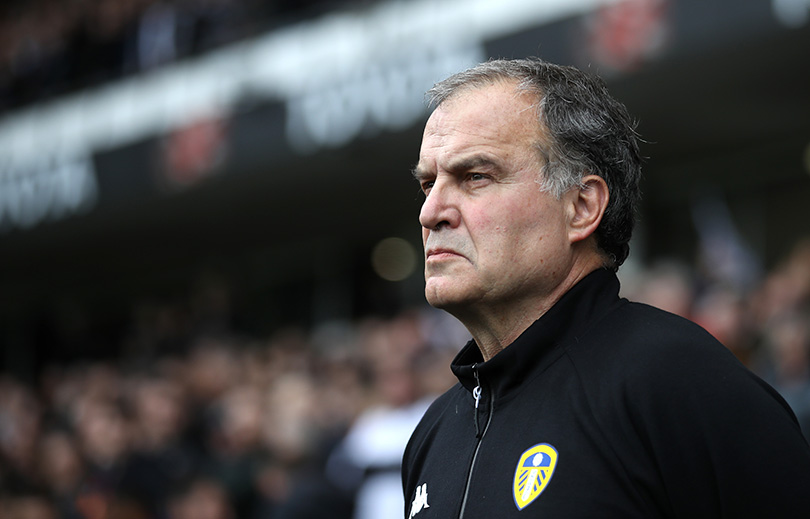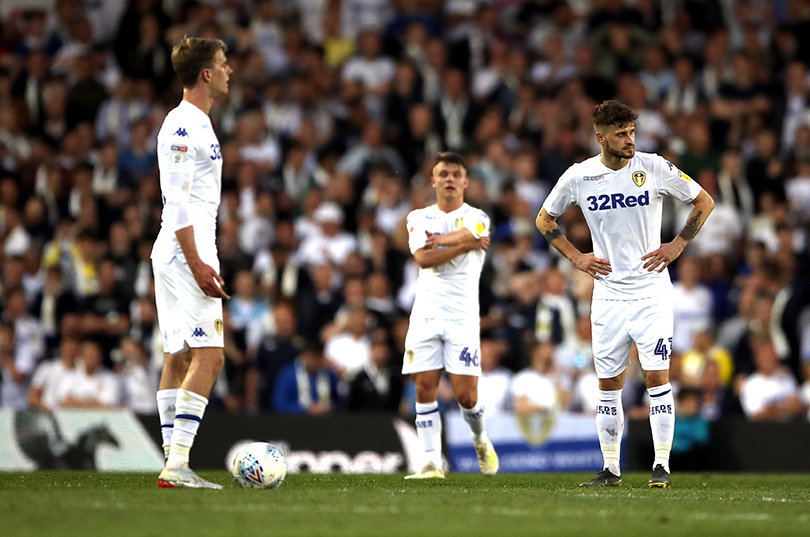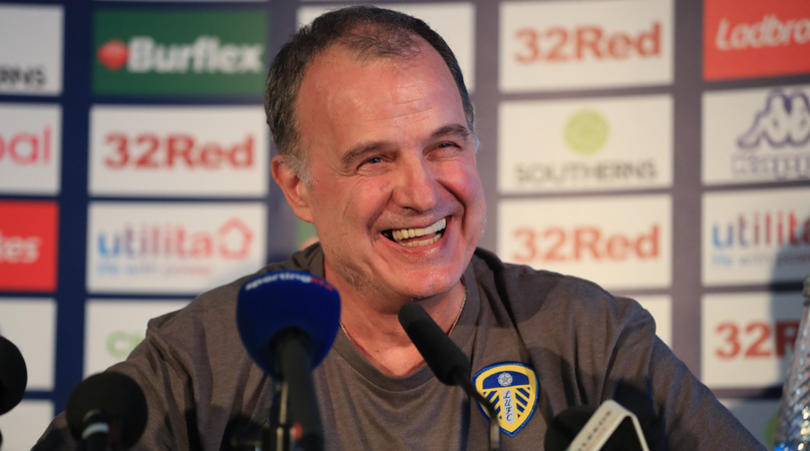Why so much more than promotion rests on Marcelo Bielsa's Leeds United future
The Argentine genius’s prospects are unclear after play-off heartbreak, and Nestor Watach explains why the stakes are far higher than a second promotion push in 2019/20

In October 1919, Leeds United were founded from the ashes of the city’s previous team. Leeds City had been forcibly disbanded a few months earlier, following allegations of illegal payments made during the First World War. The manager, Herbert Chapman, would go on to have his lifetime ban overturned and become one of the most significant footballing figures of the 20th century.
Chapman brought silverware to Huddersfield and Arsenal, but his biggest mark on football was refining the W-M formation and setting a template for how the game would be played for decades to come. Had Leeds City never been dissolved, with Chapman remaining in charge, the very identity of Leeds might have been markedly different.
A century later, the club is at another crossroads that could define its very future. Another of football’s great innovators, Marcelo Bielsa, sits in the Elland Road dugout, but there are questions about whether he’ll be there next season.
“There have been mistakes and that leads to doubts about the head coach,” said the 63-year-old after play-off semi-final defeat to Derby County. “It’s not convenient to talk about this point right now. You know about this process. If the club offers me the possibility to carry on, I will listen to their proposal.”
Bielsa led Leeds to third place in the Championship, their highest league finish in 15 years. They ended the season with the highest average possession, the most chances created and fewest shots conceded – all while suffering extensive injury crises and handing senior debuts to more than 10 players under the age of 21.
In the end, they couldn’t achieve promotion after suffering a spectacular collapse against Derby in the play-offs. Leeds squandered a two-goal aggregate lead in the final quarter of their two-legged affair, falling apart having exercised complete control over Frank Lampard’s side for three-and-a-half of their four meetings this season.
Beautiful failure was an ending to the season befitting football’s nearly man Bielsa, shepherding a club defined more by its near-misses than its triumphs.
Get FourFourTwo Newsletter
The best features, fun and footballing quizzes, straight to your inbox every week.
Not knowing if the manager stays or goes is familiar territory for Leeds fans, but rarely have they cared so much. They’re anxiously awaiting updates and checking up on what the Argentine is doing at car dealerships and hotel bars. Not since 2011 has the club started with the same manager in charge for two seasons running.
Bielsa & Orta sat thrashing out a list of potential signings! Positive signs for next season #LUFCpic.twitter.com/ObHBFVxbzT— Bryan Munslow (@thestixx) May 18, 2019
#Bielsa car shopping in #Leeds, a good sign that he’s here to stay! #LUFCpic.twitter.com/Kx4aQvuoNc— Lewis Carter LUFC (@LewisC1912) May 17, 2019
“Leeds is again a city united, football has returned. Together we are loyal, we are determined, we are proud,” read an open letter from the Leeds United Supporters Trust, which was also translated into Spanish and sent directly to the man himself.
“The long history of our club is well established, but as historical, time-honoured successes fade, there is so much still to be written and we feel this has only just begun. This season alone has renewed our hope in the future and that a new chapter of our heritage is underway. We want you to remain the key part of it.
“You have our respect, our admiration and our unwavering support. We believe in your philosophy and thank you for all your efforts. Your football makes us dream again and we’re all hoping you will continue to take us on the journey in our Centenary season.”
It’s two years since the last opportunity to build on something promising, having finished seventh in the 2016/17 season. Manager Garry Monk and top scorer Chris Wood left, while authoritative centre-half Kyle Bartley returned to his parent club Swansea. With those pillars of that play-off chase gone, the club unsurprisingly went backwards.
Should Leeds learn from those mistakes, there’s every chance that promotion can be achieved next season. Chris Wilder and Daniel Farke have shown the value of time at Sheffield United and Norwich respectively, and just a slight improvement in finishing efficiency would push the Whites over the line. Strengthening in a couple of areas, cannier use of the loan market and further development of the club’s exciting academy products might add the necessary extra quality.
But retaining Bielsa can represent so much more than an improved promotion push or anything in the short term. He can reshape the very identity of Leeds United if they allow him to build further in his image. Director of football Victor Orta and chairman Andrea Radrizzani allowed Bielsa – a notoriously demanding perfectionist – total autonomy in order to get him last summer, and that must continue if he’s to stay.

Before joining Leeds, the former Argentina manager asked to see building plans of the training ground, Thorp Arch, commanding refurbishments and changes when he took over. There are plans underway to build a new one closer to the city centre, which should be done with his meticulous preparation in mind. He could be the architect of Leeds United’s future in more ways than one.
Identity is something Leeds have lacked as they flitted from manager to manager. They failed miserably short with the supposedly tried-and-tested Neil Warnock, and also with more imaginative choices like Thomas Christiansen and Uwe Rosler. Now, not only do they have a clear sense of how they play, but the title-winning under-23s and younger age groups are being taught to play in the same frenetic style. It runs through the entire club, and such courageous pressing and physicality can even be put into the lineage of Don Revie’s famous 1970s team.
Ajax and Barcelona have enjoyed great success by following the total football dogma of Johan Cruyff, returning to the Dutch legend’s principles that he inspired as both a player and manager. Utilising space, widening the pitch and focusing on possession with players who can pass the ball was the blueprint for Barcelona’s treble under Pep Guardiola in 2009; the same philosophy that Ajax’s latest golden generation have grown up playing.
Influenced by Cruyff and ideological to a similarly fanatical degree, Bielsa can become that figure for Leeds. Ferocious pressing, optimum fitness, quick transitions and verticality in possession could become the new standard hallmarks of how the Whites play.
Bielsa is a true one-off: there’ll be no emulating his quirks, the long walks through Wetherby or his rumoured 40-odd subscriptions to worldwide football magazines. But the dedication, humility, honesty and professionalism that have enamoured supporters are also virtues for anyone to abide by.
It all sounds like an impossibly grand idea for a side that has dwindled in the second tier for so long. But appointing Bielsa, arguably the most influential coach in world football, was never conceivable in the first place. Just over a year ago, Paul Heckingbottom was in charge as Leeds jetted off to a ill-advised money-spinning tour of apartheid Myanmar. The team had finished an underwhelming 13th, winning just three of their last 22 league games.
The remarkable, instantaneous transformation is proof that the process is already underway. During the Argentine’s first season in West Yorkshire, he’s already masterminded several of the club’s most complete performances in years, crafting – by a distance – the best, most tactically astute Leeds side since relegation in 2004. Almost every player has enjoyed the best campaign of their career under his guidance, but Liam Cooper, Kemar Roofe and Kalvin Phillips in particular have looked like different players. The team is playing a different sport entirely.

The storied coach’s brand of aggressive, pressing football intoxicated the fanbase from day one, with 3-1 and 4-1 wins over Stoke and Derby in the early weeks of the season somehow looking like an approximation of his Athletic Club side that demolished Sir Alex Ferguson’s Manchester United 5-3 on aggregate in the Europa League.
How would Guardiola do with a lower-league side? This is as close as you’re getting to an answer. The structure, intensity, sense of adventure and ability to bewilder the opposition were all there, unthinkably with the same crop of players that had finished 15 points off the play-offs the season before.
Fans of Bielsa’s former clubs Velez Sarsfield, Newell’s Old Boys and Athletic Club have all taken the pilgrimage to Elland Road to see his latest project in the flesh, and it’s been easy to see how he’s inspired a cult-like devotion from fans and former players alike. The 19-year-old Jamie Shackleton has even started his coaching badges already, echoing why so many of his former pupils have go on to enjoy success in their own right.
As much as fans won’t want to contemplate a future without him, he turns 64 this summer and is non-committal to long contracts. It’s unlikely that he stays to build a dynasty himself. But there can be life after El Loco. Chile’s back-to-back Copa America wins under Jorge Sampaoli and Juan Antonio Pizzi came after Bielsa had left, but he still remains the nation’s most beloved manager for laying the foundations for success.
Guardiola, Sampaoli, Mauricio Pochettino, Gerardo Martino and Diego Simeone have all adapted elements of Bielsa’s methods to varying degrees, and some have forged more successful careers by watering down his unadulterated style with more pragmatism. With plenty of his disciples working throughout the world, there will be options to maintain continuity after Bielsa goes. Carlos Corberan, the successful under-23s coach and occasional stand-in translator, would be one to consider.
The centenary season will be Leeds’s 16th outside the Premier League. Nobody else in the second tier will have been there for longer. There are proper, fully-grown adults with utility bills, office jobs and season tickets who have never known Leeds as a top-flight team, and no memories of Elland Road at its most rocking.
The floodlit Friday night victories over West Brom and Derby; the deafening roar when two injury-time goals from Roofe turned defeat into victory against Blackburn on Boxing Day; and even the feverish sense of occasion and anticipation before that ill-fated play-off semi-final. Bielsa has shown younger fans what this football club can be, and reminded older fans of what it once was. That must continue, with or without him.
Then read…
FAN’S VIEW The hangover: coming to terms with Leeds United's play-off heartbreak
While you're here, why not take advantage of our brilliant new subscribers' offer? Get 5 copies of the world's greatest football magazine for just £5 – the game's greatest stories and finest journalism direct to your door for less than the cost of a London pint. Cheers!

